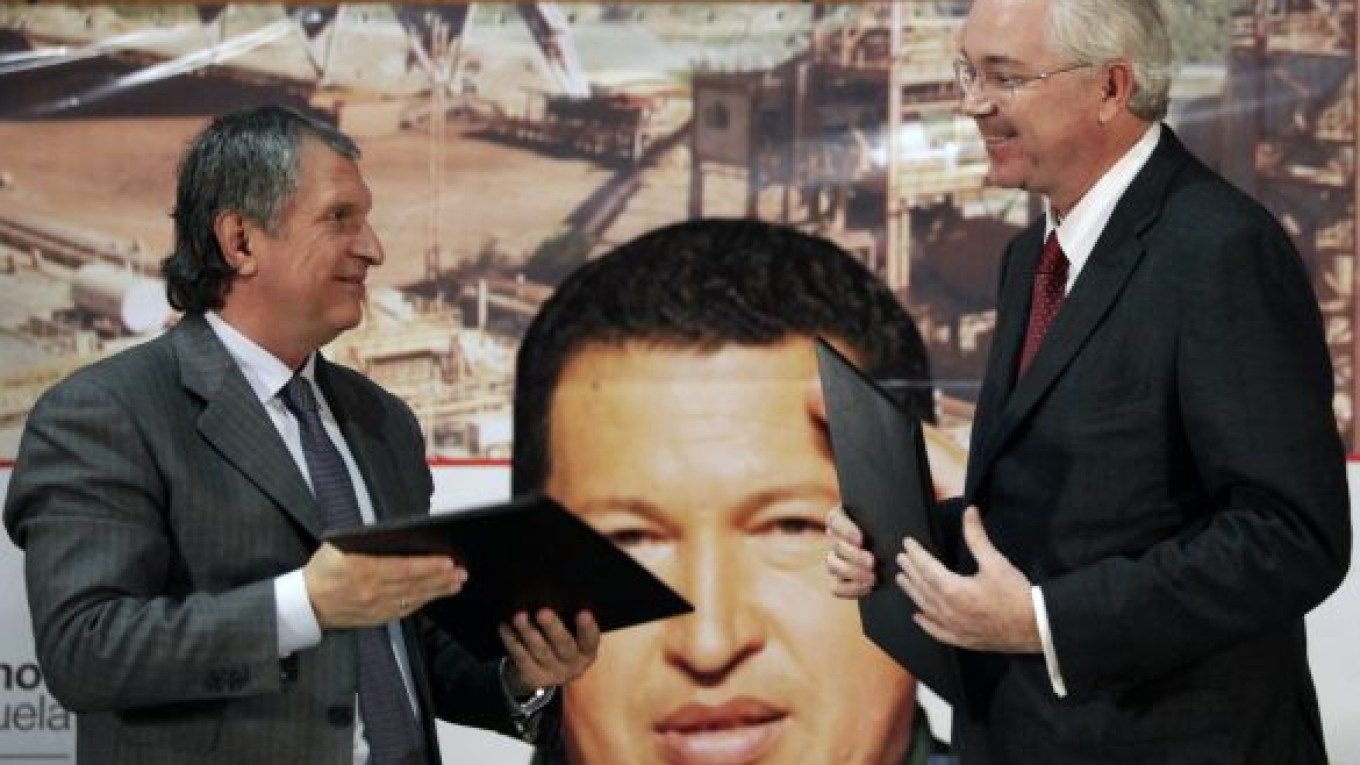Rosneft chief Igor Sechin said Wednesday that Russian investment in Venezuela remained safe even as Venezuelan President Hugo Chavez is battling cancer.
Russia is betting billions of dollars on doing business in the oil-rich country, but the potential demise of an ally has raised questions about the future of warm ties between the governments.
"We have no doubts that our investment is protected," Sechin said in Caracas. "We are convinced that our projects will carry on over the long term and be unaffected by outside circumstances."
A powerful Kremlin insider, Sechin even sought more deals in the Latin American country.
State-controlled Rosneft will hold talks with Venezuela's national energy company, Petroleos de Venezuela, or PDVSA, about joining offshore oil projects, he said.
The companies also agreed to create joint ventures for oil-service and drilling businesses, Sechin said. The drilling venture will look to Russian equipment manufacturer Uralmash for drilling rigs, tentatively 50 units, and Uralmash could ultimately set up production in Venezuela, he said.
"We are convinced that Chavez will cope with his problems as he has always done," Sechin said. "We hope that everything will be fine and that he will have the strength to overcome the disease."
Sergei Kudryashov, chief of another state-controlled oil producer, Zarubezhneft, said the company could work in Venezuela to raise output from brownfields, which are existing oil fields approaching their? capacity.
The assurance of continued partnership came hours after Venezuelan Energy Minister Rafael Ramirez had to deny an earlier news report that said Chavez's ill health was deterring investment in the country.
"Ask Sechin. It's false. Everyone is here, and we're all working," Ramirez said, Bloomberg News reported. "People can decide to invest here or elsewhere. Let everyone take their own risks."
Sechin also said existing projects remained on track.
Russian companies expect their joint projects in Venezuela to eventually pump 50 million metric tons of oil a year, or 1.03 million barrels per day, he said.
Ramirez didn't give a time frame, but he said production would exceed? 1 million barrels per day in 2020.
Russian companies have committed to investing $17 billion in Venezuelan projects, Ramirez said.
"This makes the group of Russian companies some of Venezuela's most important foreign partners," Ramirez said, Interfax reported.
Of that $17 billion investment, Rosneft will account for $10 billion, Sechin said.
The company's share of the joint output will equal about a third, or 15 million tons (300,000 barrels per day), he said.
One of the joint projects is development of the Junin-6 oil field. The first commercial oil from the deposit began flowing in September.
To pursue the project, Russia's five largest oil producers and PDVSA set up a joint venture, Petromiranda, in which the Venezuelan company owns 60 percent.
One Russian member of the consortium, Surgutneftegaz, pulled out, selling its stake to Rosneft in a deal completed earlier this month.
Rosneft said Wednesday that it had become the project's operator, taking over from Gazprom Neft. Rosneft is set to increase its holding to 24 percent with the takeover of another consortium member, TNK-BP, later this year.
In another Venezuelan project, Rosneft in September agreed to develop the Carabobo-2 heavy-oil field with PDVSA, paying a $1.1 billion bonus for the 40 percent stake and signing a deal to loan $1.5 billion to the Venezuelan company.
Sechin said at the time that Rosneft would invest $16 billion in the project.
TNK-BP has stakes in three more Venezuelan ventures. Those interests are set to become Rosneft's when it completes the TNK-BP takeover. One of the ventures is PetroMonagas, which produces synthetic oil.
Ramirez said Rosneft, which had asked Venezuela for permission to take over the TNK-BP assets, will get an easy ride.
"Rosneft can count on our political support," he said.
Sechin set out for Venezuela on Tuesday, leading a delegation of major Russian companies that includes Rosoboronexport, Russian Technologies, Inter RAO, RusHydro, Uralmash, Kamaz and several banks, Rosneft said in a statement.
Contact the author at [email protected]
Related articles:
A Message from The Moscow Times:
Dear readers,
We are facing unprecedented challenges. Russia's Prosecutor General's Office has designated The Moscow Times as an "undesirable" organization, criminalizing our work and putting our staff at risk of prosecution. This follows our earlier unjust labeling as a "foreign agent."
These actions are direct attempts to silence independent journalism in Russia. The authorities claim our work "discredits the decisions of the Russian leadership." We see things differently: we strive to provide accurate, unbiased reporting on Russia.
We, the journalists of The Moscow Times, refuse to be silenced. But to continue our work, we need your help.
Your support, no matter how small, makes a world of difference. If you can, please support us monthly starting from just $2. It's quick to set up, and every contribution makes a significant impact.
By supporting The Moscow Times, you're defending open, independent journalism in the face of repression. Thank you for standing with us.
Remind me later.


